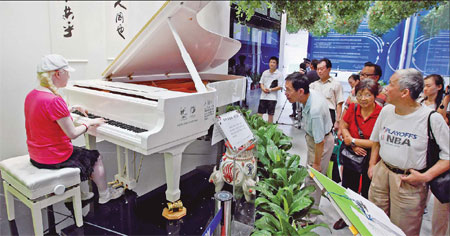Out of darkness and into the light
 |
| Yang Jieying performs at the Life and Sunshine Pavilion. Despite being visually impaired, she doesn't think life is that difficult. |
The Life and Sunshine Pavilion treats people with disabilities with the respect they deserve, Wu Yiyao reports.
The Life and Sunshine Pavilion, the first pavilion designed especially for people with physical or mental disabilities in the 159-year history of the World Expo, impresses visitors with its upbeat theme and inspirational stories.
"When I saw the pavilion's name, I thought it was promoting solar power, but then I realized it's about being positive and having a passion for life," said Nie Qiuyue, a 21-year-old college student.
Like Nie, 90 percent of the visitors to the pavilion do not suffer from any physical impairment. They come for various reasons: out of curiosity, or a desire to enter the welfare industry or simply because there is not long line to get inside.
But what the pavilion delivers are lasting memories and stirring stories. It focuses on the themes of eliminating discrimination, alleviating poverty, developing a passion for life and building a society that better caters to the disabled. It does so without calling for sympathy.
"People with disadvantages, like these, don't want our pity," said Cao Ziping, the pavilion's director. "What they crave is understanding and respect."
Many visitors said they were impressed with the volunteers, who have physical or mental disabilities.
"They are really impressive. You forget they are disadvantaged when you see how much they do," one visitor wrote on the pavilion's message board.
Artists with various disabilities from across the country have a chance to demonstrate their talents inside. Lately, a series of lustrous Thang-ka works have attracted a lot of attention.
"They're not finished yet," said Kong Yugui from Qinghai province. "I've been working on them for three months, but I still need a few more weeks."
Kong said she has been painting Thang-kas for three years.
"I learned the craft systematically from my tutors because I believed that mastering it would make me more financially independent," she said.
Despite her physical limitations, Kong said she has a happy life and a decent income.
"In the past, people thought that handicapped people were useless," she said. "I want to prove that we are as able as healthy people in all fields."
Like Kong, Yang Jieying, a 24-year-old teacher from Shanghai, conquered numerous difficulties to fulfill her dream, despite being visually impaired.
She became a pianist and has won several medals in national competitions. Yang, who has a degree from East China Normal University, works with the Shanghai Qizhi School, an institute for mentally challenged students.
"Difficulties in life? Well, I think the biggest challenge is getting my students into the classroom before class begins," she joked. "I don't think life is that difficult."
However some visitors to the pavilion may disagree after they have a taste of what life is like for the blind.
Wang Lei was surprised when his guide took him into the pavilion's "dark zone" and made him rely on his sense of smell, hearing and touch to perceive his environment.
"I was afraid that I'd trip over and fall on the ground," he said. When he finally went to the exit and saw visually impaired soccer players teaching visitors to play the game using special equipment, he was deeply moved, he said.
The good news for people with disabilities is that life is getting easier with the help of the many techonological innovations.
One of the most advanced robots in action today can allegedly scan people's brain patterns and allow them to communicate without the need for any physical motor skills.
Of the world's 650 million people with disabilities - half of whom live in cities - 83 million live in China.
"Technology alone is not enough to give us all a 'better life'," said visitor Wen Zhuoyu. "More favorable policies from decision-makers are also needed."
As is more consideration from the general public, he added.
"If healthy people stopped occupying facilities for the handicapped, such as elevators and lavatories, our life would be a lot easier."
 0
0 







Go to Forum >>0 Comments